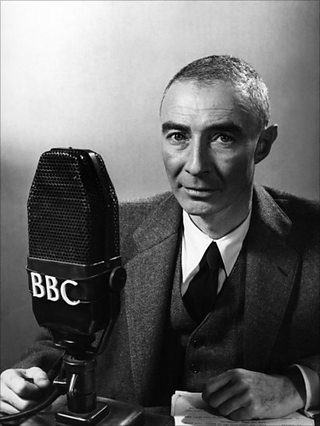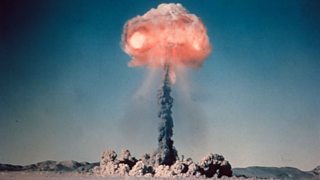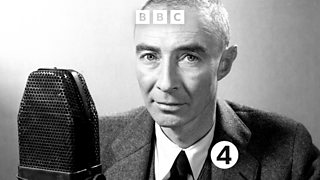8 things we learnt about J Robert Oppenheimer
In Human Intelligence, novelist and writer Naomi Alderman looks at some of the most brilliant minds in history.
She explores the multifaceted mind of J Robert Oppenheimer, scientific lead on the Manhattan Project – a vast, top-secret scheme to build the world's first atomic bombs.
He was a man of contradictions: a brilliant physicist, fuelled by self-loathing; a student of philosophy and mysticism, who longed to be an all-American hero. He was responsible for building the most destructive bomb ever used, but later called the weapon’s industry “the devil’s work”.
Here are eight things we learnt about the father of the atom bomb:
1. He was a child genuis
The young Oppenheimer certainly had big brains. “He was a child genius,” suggests Naomi.

As a boy he collected minerals, wrote up his findings and sent them to the New York Mineralogical Club, who invited him to give a lecture. “They were quite surprised when he arrived,” says the writer. “He was twelve years old. He had to stand on a box.”
2. He was once painted green and locked naked in an ice house
When he was 14, Oppenheimer’s parents sent him to summer camp. He wrote to his parents that the other boys were teaching him the facts of life – which incensed his overbearing father. His dad complained to the camp director, who then punished the boys in question.
This didn’t play out well for young Oppenheimer. The unruly boys painted his genitals and buttocks green and locked him naked in an ice house overnight. But he didn’t blame the bullies – he blamed his father. “He’d learnt a lesson early,” states Naomi. “The dog bites the cat, and the cat bites the rat.”
3. He hated being an outsider
Oppenheimer, who was Jewish, had complicated issues around his identity in the United States. He struggled with being treated like an outsider.
“Oppenheimer has this need to be accepted,” says Alex Wellerstein, historian of science at the Stevens Institute of Technology, New Jersey. “He has this need to be told, you’re doing a good job, you’re a good American, you’re one of us. He believes that if you’re not an insider, then you’re not anything. Then you can’t make any actual change.”
During his time at Harvard, it was debated whether there were too many Jews at the University. Oppenheimer’s response was to get very interested in friends and roommates who were “real Americans”: rugged, cowboy types. “Later in life, Oppenheimer liked to present himself as an all-American hero,” says Naomi.
4. He claimed to have learnt Dutch in just two weeks
“He’s really a complex and sometimes contradictory person,” says Alex. “He’s not just a boring man in a lab coat doing equations.”
The trouble with Oppenheimer is that he loves a woman who doesn’t love him: the United States GovernmentAlbert Einstein
“He was a physicist but also a student of philosophy and mysticism, interested in left-wing radical politics,” says Naomi. He (allegedly) read all of Marx’s Das Kapital on a train ride, in the original German. He learned Dutch in a couple of weeks before going to the Netherlands – and was able to speak fluently.
There were, however, people in his life who remarked upon these things feeling like an act. “This is the sort of armoury he’s wearing throughout the rest of his life,” says Alex.
5. He suffered from severe bouts of depression
Oppenheimer came to the UK and worked on atomic structure at the Cavendish Laboratory in Cambridge, but he was deeply unhappy. “He suffered with prolonged bouts of very severe depression, and loathed himself,” says Naomi.
It was around this time, after suffering a kind of breakdown in Britain, that the scientist began to turn himself into “Oppie” – a more likeable, acceptable man. “I think he does a lot of things that are revealing of a sort of insecure psychology,” says Alex.
6. He was a skilled go-between for the military and the scientists
The Manhattan Project required close cooperation between the US military and the cohort of world-leading scientists. Oppenheimer was, in some ways, an inspired pick for the role as scientific director.
“He was very good at knitting together the various people and types of work being done on the project,” says Naomi. “He was very good at holding it all in his head at once and seeing how the pieces connected. He was very good as an emissary between the military and the scientists.” The scientists respected his intelligence, insight and judgement and were happy to take orders from him, but he also worked well with the hardnosed, results-driven, military types that were directing the project.
7. Oppenheimer’s attitude to the atom bomb changed almost overnight
Despite being at his happiest in Los Alamos, his dedication to the project, and the bomb’s role in bringing the Second World War to an end, Oppenheimer did not continue to support the use of nuclear weapons.

When he witnessed the first test of the nuclear bomb – before dawn on the 16th July 1945, at the Trinity test site in New Mexico – a line from the Hindu scripture the Bhagavad-Gita ran through Oppenheimer’s mind: “Now I am become death, destroyer of worlds.”
“Oppenheimer’s attitude to the atom bomb changed so quickly, that it feels like a man who’d been in a fugue state finally waking up,” states Naomi. “By October 1945 he was calling the weapons industry the devil’s work.”
8. He had his security clearance revoked
Eventually, Oppenheimer had his security clearance taken away on the ground of past associations with communists.
“The circumstances that lead to that are totally essentially fabricated by his enemies,” says Alex. The idea that he would give all of this time, effort and emotional labour to the US government and then have them declare, for the flimsiest of reasons, that he had not sufficiently demonstrated his loyalty and character, “this is the sort of ultimate psychological damage you could do to a person like this,” says the historian.
Albert Einstein said of his counterpart: “The trouble with Oppenheimer is that he loves a woman who doesn’t love him: the United States Government.”
More to discover
-
![]()
Human Intelligence
Great Minds Don't Think Alike. Naomi Alderman dissects the minds of brilliant thinkers from the past; examining the myriad ways in which humans think.
-
![]()
You're Dead To Me
The comedy podcast that takes history seriously. Greg Jenner brings together the best names in comedy and history to learn and laugh about the past.
-
![]()
The Reith Lectures 1953
Professor Robert Oppenheimer explains how human communities resemble atoms.
-
![]()
History's Heroes
Nicola Coughlan and Helena Bonham Carter shine a light on extraordinary people from history.




